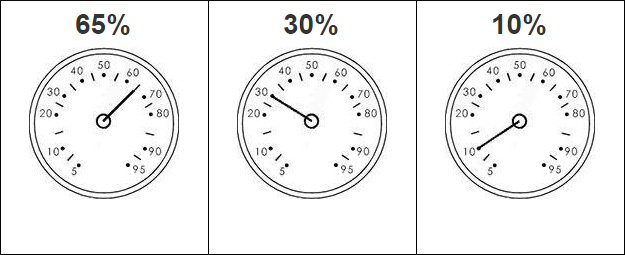Propane (also called liquefied petroleum gas and LP or LPG gas) is a widely used fuel. It’s transported and stored as a very cold liquid that can cause a “freeze burn” or frostbite if it directly contacts the skin. The liquid propane is turned into a gas inside a tank or a cylinder. In its natural form, propane is colorless and odorless. Ethyl Mercaptan is an odorant that is added to propane to make it easier to detect in the event of a leak or spill
Propane is flammable when mixed with air and can be ignited by many sources, including open flames, smoking materials, electrical sparks and static electricity. Propane vapor is heavier than air and can accumulate in low-lying areas such as basements, crawl spaces, or along floors.

Most propane tanks are equipped with a gauge which provides the approximate percent of fuel in the tank. While this gauge is only an approximation, it is a good visual indicator to know how much Propane you have. The tank gauge can be found beneath the lid or dome of your propane tank. You will find red and/or black numbers ranging from 5 to 95 on the perimeter of the gauge with a needle indicating a percentage.
Propane Tanks are only filled to 80% to allow for expansion. On the hottest days in Arizona, we will sometimes short fill the Propane tanks to 70% for additional safety. A propane tank can never be filled to 100%.
If you ever read your gauge at 30% or below, you should contact your local Arizona Propane office to schedule a delivery. This will ensure enough time for a delivery to be scheduled before the tank is in danger of running out of propane.
It’s important to become familiar with the components of your propane system. This way, you can take quick and appropriate action in case of a leak or other emergency.
Naturally, propane has no smell. To combat this, propane has an additive called Ethyl Mercaptan which is a strong odorant that is added at the refinery before being loaded into transport tanks. The unpleasant smell mimics the smell of rotten cabbage. This is similar to the familiar rotten eggs smell added to natural gas.
Certain factors may make it difficult for some people to smell propane for the following reasons:
Since there is a possibility of odor loss or problems with your sense of smell, you should respond immediately to even a faint odor of gas.
If you smell gas – Avoid any flame, spark or other source of ignition. Immediately put out all open flames. Do not operate Appliances, Cell Phone, light or light switches. Sparks and Flames from these sources of ignition could result in an explosion or a fire.
Leave the area immediately! Anyone inside of a building or area where you suspect gas is leaking should vacate immediately.
Shut off the gas! Unless the source of the leak is the tank itself, turning off the service valve will stop the flow of gas. Only turn off the main gas supply valve on your propane tank if it is safe to do so. To close the valve, turn it to the right (clockwise) until it is completely closed.
Report the leak! After getting to a safe area, Call Arizona Propane immediately from a cell phone, neighbor or other building away from the gas leak. If you can’t reach Arizona Propane, call 911 or your local fire department.
Do not return to the building until Arizona Propane (or other qualified service technician) or an emergency responder determines that it is safe to do so.
Get your system checked! Before using any of your propane appliances, Arizona Propane or a qualified service technician should check your entire system to ensure that it is leak-free.
Safety concerns, including or resulting in an explosion or fire can occur. If an appliance valve, pilot light or a gas line is left open after the Propane supply runs out, a leak could occur when your tank is refilled. Any standing pilot lights will need to be re-lit after your tank has been refilled.
To avoid these hazards, we recommend you contact your local Arizona Propane branch to discuss setting up automatic propane delivery or tank monitoring. You can also periodically check the gauge on your propane tank. If the fuel level drops to 30-20%, call us for delivery.
Many propane appliances may have a pilot light. This small continual flame is located inside the appliance. (Many newer appliances often have electronic ignition instead.) A pilot light is an important safety feature.
If you leave your home for an extended period of time we recommend closing all propane supply valves including the service valve on the tank. This will ensure that if a leak develops while you are away it will not go undetected.
When or before returning home, contact Arizona Propane to conduct a leak check before the propane is turned on. We can also re-light any pilot lights.
Call Arizona Propane immediately if you are unable to operate any part of your propane system or if you think an appliance is malfunctioning in any way. Arizona Propane will inspect, repair, replace or adjust most parts of your propane system.
Your propane system is designed with your safety in mind. Propane tanks, cylinders, and appliances incorporate many safety components to keep them safe for use. Damaging any of these components can cause gas leaks.